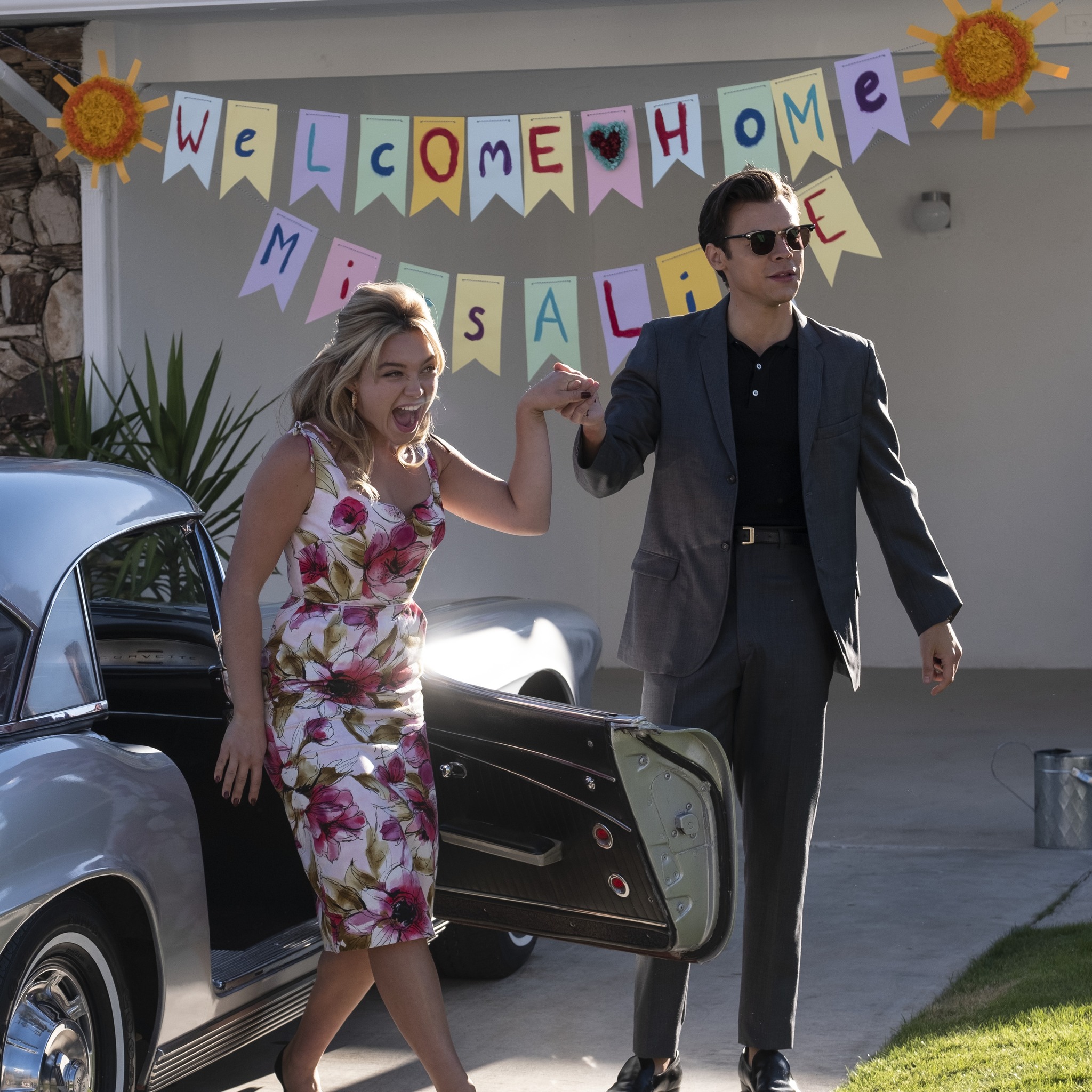
Film critic Catalina Pérez finds Don’t Worry Darling to be a convoluted and messy attempt to portray toxic masculinity and female autonomy
After her critically acclaimed directorial debut, Booksmart (2019), and a multi-studio bidding war for the rights of her second film, actress-turned-director Olivia Wilde presents her newest feature, Don’t Worry Darling.
The movie introduces a seemingly perfect and very archetypical 1950s inspired neighbourhood called Victory. Here, the men go to work on the secretive Victory Project every day, while their wives wait for them with a hot meal and a sexually available body. Alice (Florence Pugh) spends her day drinking cocktails and cleaning the house for her husband Jack (Harry Styles), when she starts picking up on the strange behaviour of one of her neighbours, Margaret (KiKi Layne). From then on, Alice starts questioning her presence in the Victory Project, what her husband is doing, and the obsessive behaviour everyone has towards the mysterious founder and leader of Victory, Frank (Chris Pine).
Florence Pugh delivers a captivating and gripping performance
The movie is listed as a thriller, and as Alice begins to discover the horrifying truth behind the Victory Project, chilling and eerie visuals and scenes start to intensify. The horror aspect of the movie is very well accomplished, accompanied by an effective and unique use of music, sounds, special effects, and cinematography worthy of being awarded. It also helps that Florence Pugh delivers a captivating and gripping performance.
Another notable performance is Olivia Wilde herself, who interprets a friend and neighbour of Alice that keeps a shocking secret. However, that’s where the positives end.
Harry Styles’ performance is perfectly adequate but a bit forgettable, however, he does have some shining moments, namely in a rage scene after he betrays his wife. The chemistry between the two leads is not extraordinary, but it delivers. Chris Pine’s character had a lot of potential to be a menacing and intimidating villain but the script didn’t give him much to play with.
The plot also feels full of potential but falls a bit flat
There lies one of the fatal flaws of this movie. The plot also feels full of potential but falls a bit flat. There are several moments where the build-up of a scene will create a very thrilling tension, as the audience waits for the big reveals (and there are several), yet it ends up not being rewarded at all, or worse, handled in a way that makes it feel improvised or last minute. The plot moves on, and leaves things unanswered or open-ended. Some characters just sort of disappear without explanation, others are confronted by their allies without any real build-up, and some are so irrelevant that the audience is left wondering why they were even introduced.
It seems like the controversial atmosphere surrounding the movie might have also affected the editing room
It seems like the controversial atmosphere surrounding the movie might have also affected the editing room, as the pacing and rhythm are easy-going, but fails to address some major questions, and instead focuses huge amounts of time showing impactful visuals of Florence Pugh’s character going insane or Jack and Alice having sex. This ends up affecting the final major sequence, where the lesson is supposed to be that women’s liberation is the key to destroying a patriarchal, exploitative, and cruel system. Those are themes that could not be more relevant at this moment in time, but because the movie forgets to explain some plot-points and expand on some of the characters, that big ending feels unearned and a bit cheap.

The movie also briefly touches on some very contemporary issues, for example toxic masculinity and the extremes it can reach when it is accompanied by radicalization and a secluded virtual community. However, it rushes over these themes by talking about too many topics, too many scary characters, and too many injustices in one go.
Verdict
Don’t Worry Darling is a gorgeous cinematic piece, with breath-taking cinematography and great performance, that sadly doesn’t quite live up to all the potential that it had. A movie too preoccupied with its stylistic choices, shocking moments and impactful visuals did not pay enough attention to the essential parts of filmmaking, like script and editing. Very important themes like female autonomy and resistance, gaslighting, toxic masculinity and incel culture were not explored enough, due to the ambition of including too much. It leaves audiences confused, with more questions than answers, but no real reflection of the topics it tried to confront.
5/10
Don’t Worry Darling is out now in cinemas
For more recent cinematic releases, check out these articles from Redbrick Film:
Comments